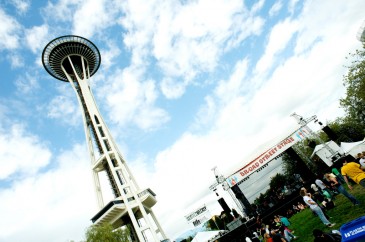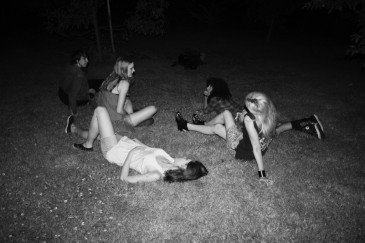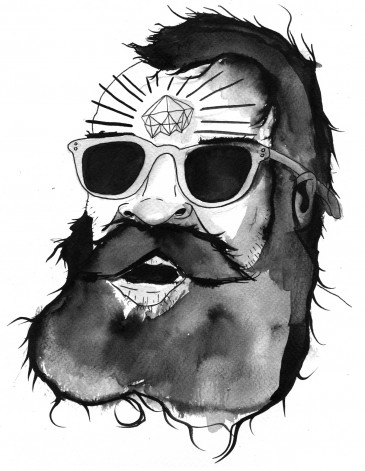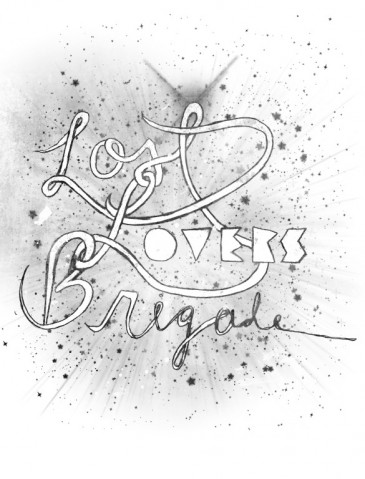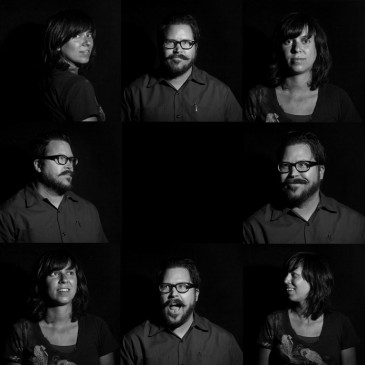
Drawn Ship—comprised of ex-Portico songwriter Lyn Heinemann and ex-Hinterland drummer Gregg Steffensen—play the kind of stripped-down rock music that speaks oodles more than their minimal aesthetic might initially suggest. The bare-bones nature of the band is at odds with their previous ventures; Portico played jazz-infused indie prog, while Hinterland took cues from dream pop and shoegaze. Drawn Ship’s debut disc, Low Domestic, is a haunting series of songs about dead love, dead friends and dead dreams. While preparing for a quick Canadian tour to support the release, Discorder was able to meet up with the duo at the Prophouse Cafe before they took off for Winnipeg.
Discorder: Low Domestic is a really simple album, musically. Coming from Portico and Hinterland, why did you decide to take that minimal route?
Lyn Heinemann: I was ready for a new project. I love Portico and all the players in it, but it just felt like it had run its course. I wanted to do a new project, but I didn’t want it to sound like Portico. It’s still my songs, but doing a two-piece was a really good way to avoid it sounding [the same]. Another part of it was that I have a little car and I like touring. Two people fit in the hatchback very easily.
Gregg Steffensen: Well, Hinterland was very complex. Each person had three guitars and we had three keyboards to lug to every gig. I don’t miss that.
D: So going from a complex band you just wanted to try something simple?
GS: Instead of a subtle shift, yeah. I’m more back to straight-ahead stuff. Even though there’s a lot of different time signatures in our band, I don’t think they’re very intentional. It’s not proggy.
LH: Yeah, the songs themselves have a complexity to them, but the instrumentation is certainly not, which is kind of nice too. It’s really accessible. I found with Portico—I’m not saying we’re crazy prog-like or experimental or whatever, we’re definitely a pop band—a lot of times it would take people a long time to enjoy it. It was really slow-growing. I feel like people listening to Drawn Ship right away hear the hooks: it’s there, it’s an idea, they get it. And it’s not so much about being a music nerd or anything.
D: What’s the timeline on Low Domestic?
LH: “Fists, Hooves, Claws,” that’s pre-Portico. I wrote that when I was really young. No one ever wanted to do anything with it until Gregg came along. He’s really stooped to that level, [he] loves that song.
GS: If you stoop to a lower level, there I am. Peering out from the dirt.
D: How did you two start creating music together?
GS: We’d [Hinterland] go to Portico gigs. I think I went to almost all of their shows. I love Portico. It’s true that I came out of not playing for a long period of time to play with Lyn because I love her voice and I’ve only got, like, five people that I’d come back and play for. It’s hard to find a good singer.
D: There are a couple of times in Low Domestic where things almost get carried away—“Sick With The Sound” and “Adventure Series” are good examples—but the songs never get out of control. Both songs have great, swelling crescendos but neither use volume to cover up the songwriting.
LH: Well, we’re repressed individuals. One of the ideas behind the record and the band itself was to make music that is as bare-bones as possible, so even on songs that have a bit of crescendo we’re still trying to keep it as unlayered as possible in order to get that sentiment across. It’s really intentional. The other thing too is that I was conscious of the fact that we’re a two-piece, so if the album is crazy we’ll never be able to repeat it live. It’s just going to be disappointing.
D: Obviously Drawn Ship sounds similar to Portico—Lyn’s voice is very distinctive and carries a lot of weight—but do you think that fans of Portico will also really like Drawn Ship?
LH: Hopefully, but not necessarily because Drawn Ship is pretty simplistic. [Portico] had a lot of jazzier-type fans that would come to our shows and get really music geeky on us. It definitely had that element to it. I think those guys are gonna be disappointed because we don’t really have as much of that. Hopefully people will still appreciate it.
D: Do you think that that’s the natural evolution that your songwriting has required?
LH: Totally.
D: Songs like “Glass Eye” were inspired by people that you’ve worked with as an addictions counsellor in the Downtown Eastside, and “The Best Ones Go” was written after the death of one of your clients. Was there a thought process that went along with writing a song about these people?
LH: They’re maybe a little cathartic. I have a lot of strong emotions regarding my work; it’s an easy thing to write about. That song particularly is a typical story of a lot of the kids I work with, so I think a lot of the kids could listen to that and see themselves in it for sure. It’s almost a tribute or recognition of the kind of struggles that they go through, and how shit their lives can be, how successful they are and [how they’re] still living their lives. Most of the people I work with, I think “man if I was you I’d be fucking dead right now,” but they’re so tough and strong. People judge them. Society judges them really harshly. If you had to go through what half of these kids had to go through… good luck.
D: So they’re tributary.
LH: Yeah, totally. Recognition.
Drawn Ship release Low Domestic through Scratch Records on September 6 and perform at Art Bank on September 24.


